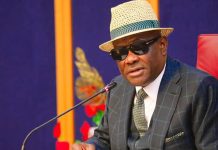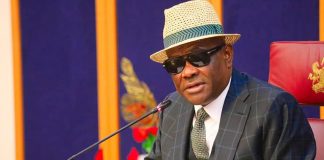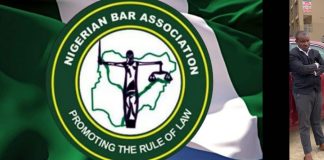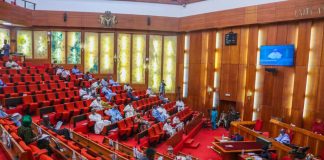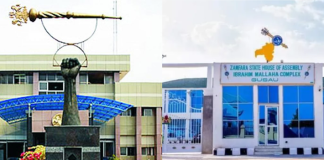🌿 Ruzu Non-Alcoholic Herbal Bitters
Ruzu Non-Alcoholic Herbal Bitters is a natural health supplement specially formulated to:
- ✅ Promote general wellness
- ✅ Detoxify the body
- ✅ Support the treatment of various ailments
Made from a powerful blend of 100% organic and medicinal herbs, Ruzu is completely alcohol-free, making it ideal for:
- 👪 All age groups
- 🌱 Health-conscious individuals
- 🌿 Anyone seeking non-alcoholic herbal remedies
Whether you're looking to boost your vitality, cleanse your system, or support healing the natural way, Ruzu Bitters offers a trusted herbal solution.
Nigerian Healthcare System Ruined by Physician Takeover – ACPN
……urge FGN to adopt comprehensive reforms based on international best practices.
By Naomi Onome
A statement signed by Ambrose Ezeh, MAW, DCPHARM National Chairman, notes that the ACPN puts on record its appreciation of the intellectual discourse created by the response of NARD and also wishes to clarify as well as put issues in clear perspectives.
Ambrose Ezeh, MAW, DCPHARM National Chairman, argues that the Nigerian healthcare system has been ruined by the takeover of physicians. The high-handedness of physicians has led to unprecedented corruption, with all positions in the CMD/CEO, C-MAC, and D-C-MACs being exclusive privileges of physicians. This recklessness has resulted in debts of over $30B owed to the pharma industry.
According to the first viewpoint, greater patient outcomes are achieved when doctors lead hospitals. This suggests that managing healthcare is, in theory, a self-sufficient career path. For this reason, like in other countries, hospitals are run by qualified, experienced administrators.
This was the standard in Nigeria until 1985, when the late Olikoye Kuti, working with his former boss, General Ibrahim Babangida, the former military president, upended this ethical order with the notorious and outrageous Decree 10 of 1985. This law has been used to force Nigerian doctors to lead FHIs.
Under the watch of hospital administrators in the 70s and up to the mid-80s, the hospital system was laden with decorum and efficiency, especially because health professionals stuck to their areas of due competence.
The health system was so good that foreigners accessed care provisioning in our land. Like we always posit, UCH, Ibadan, was rated one of the top 5 health facilities in the Commonwealth.
The takeover of physicians ruined the health system in Nigeria in the following ways:
*The high-handedness of physicians destroyed civil service norms and protocols, leading to unprecedented corruption, which has now been institutionalized.
In FHIs, all posh slots from the CMD/CEO, C-MAC, and D-C-MACs are the exclusive privileges of physicians. Some D-CMACs are designated to take charge of catering and energy in some instances, and in almost all instances, physicians are in charge of hospital procurement of all equipment and commodities, including drugs.
The recklessness is both massive and deep, such that a few months ago the ICPC branded the health sector the most corrupt realm in the national economy.
*To buttress the above, at least two physician ministers have been disgraced out of office on charges of corruption, including one under the Tinubu administration.
Several other physician-CEOs have also been casualties, including the MDs at NOH, Enugu, OAUTH, Ife FMC, Owerri FMC, Owo, and so on.
The MD of the FMC, Owo, was found culpable of embezzling COVID-19 funds.
In 90% of the FHIs, the DRF schemes collapsed under the watch of physicians who diverted these funds, leading to debts of over #30B owed to the pharma industry, as submitted by the PSN in November 2023.
*Our physician friends suffer from a lack of competence, poor leadership and communication skills, zero relationship management, and generally being too inexperienced with regard to business management strategies.
This is why brand-new and sophisticated equipment is moribund before they contemplate replacements in all public hospitals.
The NHIA, which regulates social health insurance, attained a coverage of over 10% in its first two years when pharmacists insisted administrators should be the CEOs.
Messrs. Mustapha Sambo and Dr. Mohammed Lecky were the pioneer CEOs on good record before the first physician, Dr. Dogo Mohammed, was appointed.
Since that appointment, it has been a free fall in fortune with physician-CEOs at NHIA, formerly NHIS, where the coverage rate has dropped to 1.72% since 2017, when a surgeon, Dr. Femi Thomas, was in charge.
Recently another surgeon who was given the boot for alleged excessive corruption charges and is now a subject of litigation presided at the then NHIS.
In our original petition, we drew attention to the challenges of power supply in all FHIs simply because CEOs were not creative and proactive in managing specialized systems.
*One of the biggest legacies of the leadership of physicians in MDAs is the infamous negative health indices Nigeria is known for.
In simple terms, Nigeria contends with high infant and maternal mortality rates, fake health commodities, poor logistics and supply chains, wretched immunization networks, and poor procurement practices in healthcare delivery.
No wonder we continue to lament a rating of 187th out of 191 health systems. Physicians destroyed a culture of preventive health care in favor of curative health because of pecuniary gains.
Environmental health officers are rendered ineffective often times as a result of this.
For decades, malaria treatment, which accounts for 65% of clinical visitations in Nigeria, has been solely redressed through curative therapy.
Alternatives, including prevention through chemical spray and treatments of the environment, are not attractive to be explored because physician-CEOs in primary healthcare are not interested, as it affects budgets for pecuniary interests.
According to the second viewpoint, doctors’ claims that they don’t meddle in the business of other medical specialties raise questions because they are obvious even in public. We only see instances in the fatherland where individuals focus on their vocation and maintain that other industry colleagues have no right to broaden their knowledge.
Only a few weeks ago, the PSN Lagos State and their NMA counterparts were all over the media space canvassing the modalities of implementing the Consultant Pharmacist Cadre, a creation of statutes and global reality that Nigerian physicians abhor.
Nigerians must be aware of the politics surrounding pay and salaries in the healthcare industry, particularly the tendency of doctors to bargain for what they want and then go ahead and set the terms for non-physician employees and health professionals.
The FG continues to be hounded by its own personnel, which is why the adjustment of CONHESS, which was done for CONMESS, has not been implemented in 11.5 years.
In a similar vein, physicians have perfected a climax of absurdity that places a premium on resisting the appointment of non-physician caregivers and others as health ministers, commissioners, and PS at state and federal levels.
In 1993, when Pharm Prince Julius Adelusi-Adeluyi was appointed Health Minister, the NMA actually threatened fire and brimstone if it was not reversed.
These days, it takes very brave presidents, like Obasanjo, who served for seven and a half of his eight years in office, or state governors to name a non-physician as Nigeria’s health minister or commissioner due to the fear of doctors who have ingrained a grab-grab mentality that revolves around taking all healthcare benefits and privileges for their family members.
Finally, for Nigeria to forsake the parambulations of many years of fruitlessness in the wilderness of healthcare, the government must embrace holistic reforms grounded in global best practices.



